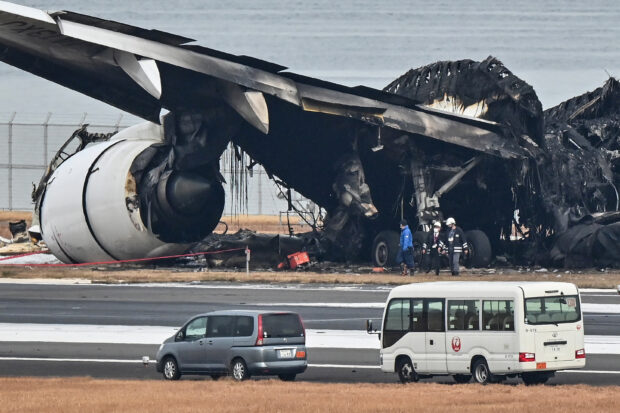Japan Airlines pilots ‘unaware of fire’ at first

Officials look at the burnt wreckage of a Japan Airlines (JAL) passenger plane on the tarmac at Tokyo International Airport at Haneda in Tokyo on January 3, 2024, the morning after the JAL airliner hit a smaller coast guard plane on the ground. Five people aboard a Japan coast guard aircraft died on January 2 when it hit a Japan Airlines passenger plane on the ground in a fiery collision at Tokyo’s Haneda airport. AFP
TOKYO — Pilots on a Japan Airlines plane engulfed in flames just after all 379 passengers and crew escaped were initially unaware the aircraft was on fire, according to fresh details reported Thursday.
The airliner collided with a coast guard plane after landing at Tokyo’s Haneda Airport on Tuesday evening. All but one of the six people on the smaller aircraft were killed.
A ball of flame erupted from the airliner before it came to a halt, with the fire beginning to spread from underneath the aircraft, footage shot by passengers showed.
However, according to national broadcaster NHK, the Japan Airlines pilots in the cockpit did not know about the fire until the cabin crew informed them.
The chief flight attendant, one of nine on board, reported to the cockpit that the plane was burning as the cabin crew needed permission to open the emergency exits, NHK reported.
Article continues after this advertisementBy this time, the cabin was filling with smoke and getting hotter, with babies crying and people begging for the doors to be opened, footage showed.
Article continues after this advertisementIn one video clip, a young voice can be heard shouting: “Please let us out. Please. Please open it. Just open it. Oh, god.”
There were eight emergency exits, but the evacuation began from two slides at the front of the plane because of the fire.
Only one other exit, at the rear left, was safe from the fire, but the intercom system was no longer functioning, so the cockpit could not give the go-ahead, JAL said.
The crew in the back deemed the passengers needed to disembark from the back door and opened it anyway, as they were trained to do.
They used megaphones and their voices to give instructions to the passengers.
It took 18 minutes to evacuate the entire plane, with the pilot the last person to set foot on the tarmac at 6:05 pm.
Soon afterwards, the entire aircraft was an inferno, and dozens of fire engines were trying to put out the blaze. That process ended up taking eight hours.
“The smell of smoke was in the air, and the doors were not opening. So I think everyone panicked,” a woman told reporters at the airport.
“Honestly, I thought we wouldn’t survive. So I texted my family and friends to say that my plane is burning right now,” another woman told broadcaster NHK.
“Passengers seemed to have followed instructions in a textbook manner,” Terence Fan, an airline industry expert from Singapore Management University, told AFP, with others praising those on board for leaving their cabin bags behind.
“This is exactly what evacuation policies are designed for — the airframe itself is not meant to survive the blaze, ultimately.”
At least one pet dog and one cat had to be left on the plane and died, the airline said.
Confusion on runway
Investigators from Japan, France, Britain and Canada were probing the crash on Thursday, with the charred remains of the two planes still littering one of Haneda’s four runways.
The flight recorder and voice recorder from the coast guard plane had been found, but those of the passenger jet were still being sought.
The transport ministry on Wednesday released transcripts of the flight controllers’ communications, which showed they approved the JAL flight’s landing, media reports said.
But the coast guard plane was reportedly instructed to go to a spot near the runway.
Earlier on Wednesday, NHK had reported that the pilot, Genki Miyamoto, 39, said immediately after the accident that he had permission to take off.
Japan has not experienced a severe commercial air crash for decades.
In 1985, a JAL jumbo jet flying from Tokyo to Osaka crashed, killing 520 passengers and crew, in one of the world’s deadliest crashes involving a single flight.
The world’s worst civil aviation disaster also happened on the ground when two Boeing 747s collided at Los Rodeos Airport in Tenerife in 1977, killing 583 people.